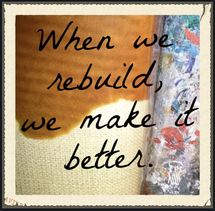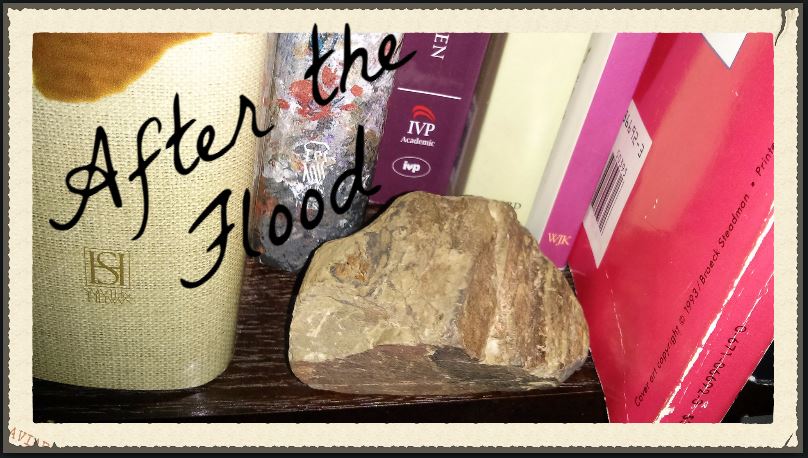|
This is the day the Lord has made; let us rejoice and be glad in it. Psalm 118:24 -Rev Melissa Fain- Light Warning for those who dealt with depression, as I will be discussing my journey through it. Tuesday, I was driving to drop my daughter off at Pre-K and get to work. In my head, I was running through the final two weeks of school. In two weeks we'd be on break. In two weeks, I'd never have to drop my daughter off at car rider line again. She would ride with my husband and son to school. My work schedule would be able to change. I wouldn't have to rush. I could focus more on home and ministry... I stop working through my list. "This is the day the Lord has made," I murmur, "let us rejoice and be glad in it." Suddenly, I begin to take in the day. The mist rising from the lake. The morning sun hitting the trees. My daughter belting Let it Go from the back seat. That snip-it of Psalm is a spiritual mantra for me. It was only seven years ago I felt the dark abyss of depression. It didn't matter that we had insurance, we couldn't afford the mental help I clearly needed. Some days it was realizing that black ice nugget of emptiness was simply emptiness that day. Other times, it was practicing deep breaths while my children played around me. It was extremely difficult, and four years later I began to make substantive strides to pulling myself out of that pit. Anyone who has made it to the other side of depression can probably understand what I'm about to say. Depression is like a boat being cut from it's anchor. At the time, I knew the cold emptiness of it. I just didn't understand the disconnect. Sure I felt like a ship lost at sea, but I thought I was making that choice. I was choosing to distance myself from my friends and family. It was like depression would cut the tie, and hand it to me. Sure, I never had to let go, but it was tiring holding ties that normally stay connected without any intervention. Eventually, it was just easier to let go, than hold on. Four years later, I knew what I needed. I needed an anchor. I needed a way to bring everything into clarity. An old camp song came into focus. The day. The moment I was in. It was created by God. I should rejoice in it. Sometimes, that rejoicing was a tired thank you, with little or no joy. Sometimes, it was grateful thanks, spoken with a smile on my face. It anchored me. It gave purpose to my day. Today, it reminds me that there will always be things to dislike and wish would be over, but it doesn't change the purpose of the day: A day created by our Lord, and we should rejoice. You can take this two ways. Either you can realize that everything, even the day we are in are gifts from God and we should cherish them. Or two, we can realize when all those anchors and ties are waving in the wind, God is still there to be an anchor. Both are true. May you take from it what you need. Good and upright is the Lord; therefore he instructs sinners in the way. He leads the humble in what is right, and teaches the humble his way. All the paths of the Lord are steadfast love and faithfulness, for those who keep his covenant and his decrees. Psalm 25:8-10 NRSV -Rev Melissa Fain- "Where's your humility?" my husband asked me in my late 20's. "You are so ready to take on the world, but what do you really know about the world?" I shrugged my shoulders. "I'm just ready to do this!" And I was. I was like a yipping dog on a leash, dragging her owner behind her. I was so ready to just get to it! I was ready and willing, Ready to pastor and educate the love of God. "Where's your humility?" If I were to compare myself to a biblical character during this time, I was completely Peter. Zealous to a haphazard degree. The first to raise my hand. The first to volunteer. The first to push away Job to hold a holier than though approach to life. Jonah running away?! Pshaw! I would have marched in exuberantly announcing God's word to the people! "Melissa, where's your humility?" Where was my humility? It was on the journey. I've picked it up little pieces at a time. It came with the gift of time. The younger me would have seen it like the shipping and handling charges tacked onto that TV infomercial product that's just too good to be true. Humility cheated good people out of being able to speak up and act. It was because the childhood me knew the moment I opened my mouth was a nerve-raking moment. Even though I was born in the United States, you are not reading a native to the American Culture. I'm more like the feral child found in the woods and I have appropriated the American culture to speak the American language. My broken childhood stunted my social growth. This meant the first spiritual lessons I had to learn was as far from humility as it could be. My first spiritual lessons were in self-confidence. Therefore, when I began to master self-confidence I was all Peter. Try telling someone who hasn't had a cultural voice for a quarter of a decade to shut up when they finally find it. Now I'm on the edge of middle aged. Where is my humility? I no longer see it like shipping and handling charges. Humility is more like the extra time put into the product. Time has taught me that humility is more than stepping back so someone else can step up. (That would be my late 20's answer.) Humility coats everything you say and do. It understand there will always be someone better than you. It's knowing everything you do speaks from the voices of countless thousands. This is because even the smallest conversation had the ability to influence you. Many of those relationships you don't even realize you had, but they still hold the grain of influence. My humility is in knowing any number of people would be better at my job than me, so I better realize it when I think I could do someone else's job better. My humility is in realizing my situation in life is made better or worse by those around me and sheer luck. Just because I may be able to pick myself up, doesn't give me the right to criticize others who haven't been able to do the same. I do not personally know their situation. That's humility. It is in that spirit God works. Teaching Job the world is bigger than him. (Oh how I love that Job today.) Helping Jonah speak peace to the oppressor. (How I would never want to fill Jonah's heavy shoes.) In teaching Peter that denial comes to even the most fervent of believers. In our humility, God acts. May we all be vessels of that action. 20 After he said this, he showed them his hands and his side. Then the disciples rejoiced when they saw the Lord. 21 Jesus said to them again, "Peace be with you. As the Father has sent me, so I send you." 22 When he had said this, he breathed on them and said to them, "Receive the Holy Spirit. 23 If you forgive the sins of any, they are forgiven them; if you retain the sins of any, they are retained." John 20:20-23 NRSV This week the Holy Spirit comes up in lectionary. Speaking personally for a moment, I had a view of the Holy Spirit when I was a child. I always saw it as feminine. I can remember I used the feminine pronoun all the time. To me, God was non-gender specific, Jesus was male, and the Spirit was female. This was huge for me, as someone who was raised by a father, and no strong female influences nearby. As a child, congregants at my church would simply inquire, "Why are you saying "she"?" I'd be happy to share my theory, and they added nothing more.
It wasn't until I entered high school, and I came across an overzealous Baptist. He heard I was going into ministry. It didn't matter that my high school self believed that was music ministry, and not pulpit ministry, he was going to soundly put me in my place. Every time I met him, he came with a bible full of little dog ears. At first I discussed the passages with him, but then I realized he was cherry picking, a word here which means he was pulling a single verse without context. (Sorry, I've been reading A Series of Unfortunate Events to my son.) By that time, I had been using contextual analysis for a couple of years. It was basically the only theological tool I could use at that point. Then he came with the big guns. You know the ones: Paul and Timothy. That's when I realized he was getting outside help, probably from his minister. Once I started getting outside help, well it was over. Both of us had lost, as the conversation reached the point of absurdity. Anyway, months after our bible battle had ended he heard me refer to the Spirit as "she". "What are you doing?" He bluntly asked me. At first I didn't know what he was talking about. Once he clarified, I told him the same thing I'd been telling congregants. "You're wrong. How can God be non-gender specific, when we call him Father." Straight to the heart. Also, the Holy Spirit is a male, and I have bible verses to back it up. K.O. He destroyed me in two sentences. This is a great example of how the bible is both a tool and a weapon. When used appropriately it can heal, help, guide, and grow. Used incorrectly it can destroy people. I've been destroyed by the bible before. I don't think this kid realized what he was doing. He was doing more than getting a fellow sister in Christ on the same biblical page. He was severing a very important spiritual connection. I had no self-esteem. I believed I was worthless. I needed to understand how I was made in the image of God. If God couldn't be female, I must not be crafted in that image. Like I said, he destroyed me. The point: The spirit comes when we don't expect it. It's form is ambiguous on purpose. In the New Testament alone I can name three very different forms. Of the Earth: Like a dove that drops down on Jesus at his baptism. (I know, I know. We both know this is a really loose connection, but I loved that title so much I had to use it. Yes, it's probably the exact opposite of Earth.) Wind: In our scripture for today, Jesus breaths the Spirit on the Disciples. Fire: The Spirit lights upon the Disciples like flame. The Spirit comes to each of us outside of our knowledge and biblical know-how. It gives us what we need. A gentle drop of love and acceptance, when coming out of the baptismal waters. A promise of connection, no matter what. A fire to keep us going when all seems lost. A realization that all of us are made in God's image, no matter what. Perhaps our biggest problem today is not in what we can label, but in letting go in what we can't. I don't know why I decided to visit her. My fate was sealed. I was leaving, and it frankly didn't matter what I did by that point. I no longer owed anyone, anything. Actually, now they owed me. Two months of full pay, the opportunity to stay in the parsonage until February, and money to help move. Thinking back on it all, I still feel dirty. I wanted to enjoy the new life that had just been born. Instead I'd cry at random times during the day, sometimes while holding my baby girl. Still, only a few days after it all went down, I went to visit a congregant. Even though the vote was private, I knew where she fell. All the Elders voted to let me go. I also knew, many of those votes were manipulated and strong armed. "It is the only way to keep the church together." (It led to a church split.) "Deacons don't have votes." (They did.) "This is family." (That one was true.) More alarming was the communities words, "Oh, I see it happened again." I would eventually learn it happened in some from to almost every minister post 1980. Why 1980? That's when the church split over charismatic differences. The split eventually failed, but the damage remained. Researching their history I heard and read of ministers damaged and broken by the church. They always tried to oust the minister privately, but they couldn't do that with me. I came broken. Seriously, right after I took the call I broke my ankle. Then, once I was on the mend, I got pregnant. Everything hit the fan just as I was in a place to be well. I knew my life would take certain turns after I left that town. In the beginning, there would be morbid curiosity. We like to look at a car crash. There is something that causes us to drive just a little slower than we need to so we can crane our neck back and look. I knew immediately following the event I could have capitalized on the gore. At the same time, I knew I needed to stay quiet; to let the event sit. I wasn't called to speak of woundedness. I was called to map the road to healing. I'm not called to be the poster child for the Flashy New Church™. My experience is not one that is comfortable, or easily branded. I'm also not unique. This one probably breaks my heart the most. There are broken ministers, congregants, and churches all over the United States. The problem is, and yes you can call this a problem, we are stuck on the car wreck. "Wow did you hear what so-in-so church did?" "That was horrible!" Then out of sight; out of mind. No one talks about the car crash when they get to the grocery store. By then, you are more worried whether you are going to get the right brand of snack cake. Once your home, it might only be an interesting side note to tell anyone home Then it's forgotten. Meanwhile, someone is still suffering. Someone is possibly mourning. Everyone wants to tell their story, but no one wants to listen to recovery. Recovery is boring. Recovery is only interesting if something flashy happens. We want a good story. Who can put the church's problem in a click-bait title, where the problem is solved in exactly three steps? The answer will be simple to understand, like, "Eat less; exercise more." Doing the answer will be blood sweat and tears. Sometimes, literally. Getting the answer will be like getting pregnant, and following the answer will be like carrying that answer in your gut for nine months. It will be about ripping you apart to get to God's grace and love. It's about getting to the wilderness, and being tempted. Then, when that flashy choice is given, turning it down. It's about knowing everyone has moved along, and you are now without support. This is the right way to deal with being sent down the wrong path. If that's not enough for you: here's the one liner. The obvious line that will get us on track is this: The answer to the church is getting to know the community they serve, and acting in that community with Christ's love. I would love to hear from you. There are several ways to communicate and connect:
Join Fig Tree's Subreddit Follow our Pinterest page Like us on Facebook Follow us on Twitter I love this rock. I've shared it before. A few years back Atlanta had a really bad flood. Six Flags, and I-20 next to it was under water. All the neighborhoods in and around Clarkdale Elementary was completely submerged. (The smell of mold lingered in the area for years. There are still houses that remain vacant, because they simply need to be torn down There is nothing else that can be done with them..) Part of the road in front of our home was washed out. It made it precarious to pull out of our drive way for months. My husband worked at a school. The road next to it was completely washed out. That's where I got this rock. Before the flood it was buried under feet of dirt and pavement. I keep it to remind myself of the fragility of life. Even things we think are solid can be ripped apart in the matter of hours, maybe minutes. That's not what I'm here to talk about today. When the waters receded, and cleanup began, I watched the world being put back together. There were four areas, near to where I lived, that were hit pretty bad. Off of 92 there was an old bridge that was completely obliterated. There was the road in front of our home that was half way washed out. There was the road next to the school that was completely washed out; where I got my rock. Finally, there was Clarkdale Elementary School, completely flooded out.  There was something that didn't happen to these places after the flood. They were not rebuilt to be exactly what they had previously been. The storm came. It left, and these areas were found lacking the ability to withstand such a situation. Even in the case of Clarkdale, where there was nothing that could be done to keep those waters out of the school, they had the opportunity to make it better for those kids. Not only was the road in front of my home repaired with extra fortification, a fence was put up to protect people from the chasm that lay on the other side of it. The bridge off of 92 was never rebuilt. A better path was chosen for the cars to cross. As for the school road? A bigger pipe was installed so it could handle the waters if they were to return. The point is, when a structure is tested, and fails, the new structure should be built to withstand the very thing that made it fail. Bringing the focus to the church, in many ways the storm is over. For the American Church, we've come through broken, and in pieces. Over the past half decade I've been to many of these churches, and you have no idea how many just want to rebuild to some pre-storm status. More than that, we think we can do it when our very core has been washed away to almost nothing. We can't do that! Why are we so nuts?! The answer is incredibly simple. Research how to rebuild with the churches new situation in mind. Don't discount new technology (i.e. research) when rebuilding. Follow the new plan! The problem is extremely difficult. We can't do any of that until the church accepts the storm came, and things can't be done the same way anymore. In some cases, it's just making what they already have better. In many cases, it's completely changing things up. That's scary. Old "building plans" can't be used. (You know, the classic method of finding a new Vision. Doesn't work anymore. Congregants know how to hijack the system in their favor.) Churches are so focused on what they had, they can't accept what God wants them to be. Solution: Have a funeral for the church of the 1990's, and mean it. You can't bring it back, and you can't move on until you let it go. The storm is over. Pick up the pieces and rebuild. I would love to hear from you. There are several ways to communicate and connect:
Join Fig Tree's Subreddit Follow our Pinterest page Like us on Facebook Follow us on Twitter I wanted to write something up on the 166 Georgia Regional Assembly. Especially since I was sitting in worship, and decided that was not the place to tweet pithy, but moving, comments. This is your Regional Assembly. We are anchored to the Georgia Region. (Whether you are from Michigan, Tennessee, Kalamazoo or Georgia. This is your Assembly.) In all honesty, as any church begins to incorporate a digital footprint, their identity will be more symbolically tied to a specific region. Anyway, I was thinking of what to write that spoke specifically to my experience as both a digital and physical pastor. (I fill in at various churches on Sunday. I spend a large amount of time at a specific church: Community Christian Church. To be honest, many of us live this double life.) I realized, as my daughter played monkey in my lap during dinner Friday night, I had something very specific to discuss. It's a topic many can relate to without being a congregant here, or even a Disciple of Christ. I want to discuss being a mother, and being a minister. It was Saturday afternoon. The business meeting had just let out, and people were going to their respective places for lunch. Specifically, the men were going to the Disciple's Men's meeting. The women were going to the Disciple's Women's Meeting. Everyone who hadn't paid for their ticket was going out to eat. I had a women's DoC ticket, so I grabbed the kids and we waited in line to get our food. The plan was to talk with the women from Community Christian Church. One of the congregants had saved a seat for me and everything. The only problem was, I had two kids with me. Even if they could have saved three seats, the small round tables were too small. I apologized to the congregant, taking my things to move to an empty table in the corner. After sitting down my son remarked, "Are there any men here at all!" I sighed deeply. I knew this was going to be a struggle. "No," I replied. This is a Disciple's Women meeting. "I don't want to be here! I'm a boy! Let me go to the guy meeting with [insert the male congregant he knew from Community]." Attempting to rub my face off in frustration, I replied, "No. He is not your responsibility. I am. You are not going to him." I looked at the chicken nuggets on his plate. They were special for the kids in the room. I wondered, did the Men's DoC meeting have them too, or were we still living in a world where all children stayed with the females? I looked down, where the men were gathering in an enclosed Pavilion. They nonchalantly were laughing and conversing. At the time I couldn't tell. After sitting down my daughter spilled her drink all over the table. There were two ladies sitting with us, and as the drink spread over the fabric tablecloth, I apologized over and over to the two women. "It's okay," the responded, "You are a mother. It happens." I knew this was the official socially acceptable response. I was completely embarrassed, as I pulled the tablecloth back in front of my daughter, so she would have a dry place to eat. The meeting continued, and my son was getting restless. He knew he was out of place. In the opposite corner a group of children sat with their chicken nuggets. I already knew what Rev. Betty Brewer-Calvert (the head of Women's ministries for the state of Georgia) would say about my children. They were welcome, distractions and all. The problem was, my son didn't feel comfortable, and wouldn't feel comfortable. He kept asking to leave. Giving up, I took them out. Taking my daughter's new drink, we went downstairs to the well. The well was a sunken in area set up like a mini-indoor amphitheater. Mandala's had been set up for prayerful contemplation. I gave the kid's crayons and told them to color. A few minutes later, I realized my daughter hadn't drunk hardly anything since lunch. I asked her to go to her drink and take a sip. In slow motion I watched her move her foot across the drink, and watched it fall into the well. Running to the bathroom I grabbed a ton of paper towel. Sopping up the mess I thought, "Please don't let a member of this church see what I'm doing. Please don't let a member of this church see what I'm doing." Like I was calling their name a member of church rounded the corner and glared at me. Not a word was shared. No help was given. She continued walking down the hall. "I give up," I mumbled. Leaning back, I watched the Men's meeting concluding. Most were laughing and patting each other on the back. I too wanted to be chatting it up and laughing. Taking the kids upstairs, I wanted to take a breath, but one of the ministers looked at me, "Stole up!" I had completely forgotten. The ministers were entering worship in twenty minutes with their stoles. Also, I was in worship, and they were getting ready to pray. I had to get the kids back to their programs, get to my car for my stole, and get back in time to at least make the prayer! Gathering my children back up I began the process. Just as I was headed downstairs to drop the kids off, a hand gently landed on my back. Turning around was Rev. Jamie Brame. I had been looking for him all weekend. "Oh, Jamie!" I must have looked as exasperated as I sounded, "I really want to talk." This was complete truth. "I can't. I have to run." This was also true. We shared about 15 seconds of a quick "Nice to see you," and I was running the kids downstairs. Then I was running upstairs and out the doors. By the time I was back upstairs with my stole, they were just ready to pray. Rev. Roger Sizemore whispered in my ear, "Rev. Denise was asking for you." (Rev. Denise Bell is the Georgia Regional Minister.) Making eye contact with Denise, I nodded my head, and she nodded hers. Our secret dialogue was complete, and she had nothing to fear. (I already knew what she wanted, and she knew I knew.) Then we prayed. I made it. Somehow, I made it. There were a few things going into this Assembly I wanted:
I might have come home disheartened that people saw me struggling with two kids, but I had an example myself. That example was there, at the assembly. Also, this example might surprise you, because the example is male. Leading Soul Fire during the closing worship, Rev. Jeff Shimizu played the guitar. He did not "stole up," but he is ordained. Back about a decade ago he had two boys that hung from his arms. They were messy, and distracting. He handled them with grace. I'm sure there were congregants that gave their own glares at his boys, as Jeff tried to lead Saturday worship and be a parent. The boys were there too. All grown up, one was on drums and the other watched in a seat. In a world where their age group is avoiding church, his participate. Jeff, in a very real way, was and is a pastoral parent. So, I'm glad I was there with my kids. Maybe some day there will be another Pastoral Parent, struggling to juggle ministry and children. Maybe they will see my kids, all grown up and realize there is something sacred about the messy, and distracting. Two days ago I went to a Mental Health First Aid (or MHFA) training. It was an eye opening experience. Just to share the top of the iceberg on what I learned. I learned, the average time a mental issue arises to the time a person seeks help for that problem, is 11 years! I also learned 1 in 4 people suffer from a mental illness at any given time. Speaking personally, I have lived through two traumatic events. The first was a familial event in my childhood. Because of this training I realized it resulted in me unknowingly self-harming through hair pulling and keeping my wounds from healing. My second traumatic event happened in the church. I believe it left me with PTSD and minor anxiety and depression. (I use the word minor, but it didn't feel minor when I was going through it. It felt like I was being weighed down into utter darkness with no release.) I was able to find tools to help me, and now I'm recovering. I am fortunate. My recovery might have been easier and got me back to a place of recovery faster, if I had a MHFA certified person there to see the warning signs and get me help. When I decided to do a movie month I had not put my schedule and my movies together. I had no idea how the clear mental issues of Howard Hughes would play into my MHFA training. There were a few things that stuck out to me.
I can tell you I left the training in a bittersweet mood. Sweet, because now I had actual steps, and a book to help me understand how to talk to someone in mental crisis. I feel more prepared. Bitter, because I feel an even deeper failure from the adults who were supposed to care for me. I'm not mad, because they didn't know they needed to do something. I was just bitter. I'm bitter for me, I'm bitter for Howard Hughes, and I'm bitter for everyone who struggles with mental illness and doesn't know how to name what they are going through. I'm here mostly for you. And, maybe it's just trauma that didn't result in upsetting a person's mental wellness. I'm here for you. (MHFA is only training to notice certain symptoms and helping people find the proper help when those symptoms are seen. It does not replace a therapist, medication, or other clinical helps the person might receive.) We would love to hear from you. There are several ways to communicate and connect:
Join Fig Tree's Subreddit Follow our Pinterest page Like us on Facebook Follow us on Twitter 21 So Balaam arose in the morning, saddled his donkey, and went with the officials of Moab. 22 Then God became angry because he went. So while he was riding on his donkey accompanied by his two servants, the Lord’s messenger stood in the road as his adversary. 23 The donkey saw the Lord’s messenger standing in the road with his sword drawn in his hand, so the donkey turned from the road and went into the field. Balaam struck the donkey in order to turn him back onto the road. 24 Then the Lord’s messenger stood in the narrow path between vineyards with a stone wall on each side. 25 When the donkey saw the Lord’s messenger, it leaned against the wall and squeezed Balaam’s foot against the wall, so he continued to beat it. 26 The Lord’s messenger persisted and crossed over and stood in a narrow place, where it wasn’t possible to turn either right or left. 27 The donkey saw the Lord’s messenger and lay down underneath Balaam. Balaam became angry and beat the donkey with the rod. 28 Then theLord opened the donkey’s mouth and it said to Balaam, “What have I done to you that you’ve beaten me these three times?” 29 Balaam said to the donkey, “Because you’ve tormented me. If I had a sword in my hand, I’d kill you now.” 30 The donkey said to Balaam, “Am I not your donkey, on whom you’ve often ridden to this day? Have I been in the habit of doing this to you?” Balaam said, “No.” 31 Then the Lord uncovered Balaam’s eyes, and Balaam saw the Lord’s messenger standing in the road with his sword drawn in his hand. Then he bowed low and worshipped. 32 The Lord’s messenger said to him, “Why have you beaten your donkey these three times? I’ve come out here as an adversary, because you took the road recklessly in front of me. 33 The donkey saw me and turned away from me these three times. If it hadn’t turned away from me, I would just now have killed you and let it live.” 34 Balaam said to the Lord’s messenger, “I’ve sinned, because I didn’t know that you were standing against me in the road. Now, if you think it’s wrong, I’ll go back.” 35 The Lord’s messenger said to Balaam, “Go with the men. But don’t say anything. Say only that which I tell you.” So Balaam went with Balak’s officials. Numbers 22:21-35 NRSV This month is all about animals. Last week we looked at the lions in the den. Next week we discuss the bears and the children. This week it’s all about the donkey. Donkeys were an important part to Middle Eastern culture. When they were domesticated in the fourth millennia BC, they changed the world, as we knew it. First, they were an easier animal to work with. More so than the cud chewing ox. The domesticated donkey meant more could be accomplished and, people could travel further. It was a beast of burden, but a steed of royalty. Let me recap the scripture, no there is too much, let me sum up: We have this story about this guy who just wants to get what’s his. The price is right, so he sets out on a quest for someone else. During his adventure he decides he is not going to work for the guy who hired him. Instead, he’s going to help the focus of the initial quest. Oh yeah, and there’s a talking donkey… and I’m not talking about the hit animated comedy Shrek. I’m talking about Balaam, the foreign prophet. It’s a story we are supposed to laugh at. A donkey sees God when Balaam can’t. Balaam punishes the donkey for saving his life. Ancient Near-East comedy at its best. After all, it’s not our prophet, so it’s OK to snicker. It’s part of the reason I’m drawn to him. It’s not like he chose to be born outside of Israel. God still called him. For goodness sake, why is no one laughing at Jonah? He thought he could run away from God and found himself in the belly of a big fish! Oh, it’s because he was an Israelite. That makes it unfortunate, and a good life lesson. Not something to laugh at. I’m drawn to this outsider because I feel I can relate. As a young child, my mother’s second husband brought domestic abuse, neglect, and verbal abuse. It would take years to deal with the damage it did to me. I was in seminary when I first understood it for what it was. I don’t care to talk about my past anymore, but I used to wave it like a flag. I used to think my past made me special, because it was the only time people paid attention to me. In truth, because I couldn’t see that my past broke me, I was unwilling and unable to heal. It left me unable to connect with people. In being broken, I had no place to talk, and nothing I could add to the conversation, until I was willing to admit I was broken. Then I had to piece myself back together first, before I shared my story. Now on the healthy side of life, I tend to see the person who sits on their own, or doesn’t connect as easily. I’m drawn to helping them relate to the group. I’m often frustrated when someone does something that ostracizes people, or how some seem to naturally get a pass because they were born to the right family or accepted by the right people. So, yeah, I’m naturally going to stick up for Balaam, the outsider prophet. Then there is the other side of the story. Last week I told you there was a time to stop talking. There are times when the best gift you can give someone, is the gift of presence and silence. Outside of crisis, there are also times to act, and open our mouths. I may have a soft spot for the outsider prophet Balaam, but this prophet was still about to go to Israel and throw down a curse. See, Balaam was not like the other prophets we read about in the bible. The other prophets get a message from God and share that message. Balaam, on the other hand, was a prophet for hire. He was known for his ability to throw out curses and blessings and have them stick. If we had read earlier in scripture, we would have learned King Balak was scared. He saw what the Israelites had done to his neighbor, the Amorites. He was afraid his land of Moab was next. He decided to call for Balaam. We don’t know how, but even with multiple warnings from God, Balaam eventually decides to take Balak’s money offer and go curse Israel. This is the story of the bad guy Balaam becoming a good guy. (Still sounds like Shrek, but let me continue.) We all know those people. They are the ones whose actions purposefully or inadvertently hurt those around them. Because the community is a system, ultimately the person endangering others gets hurt too. Balaam was headed down the wrong road, literally. It was going to lead to a whole heap of trouble. You know, when we are called to be quite, we are acting to not hurt the person in crisis. When we are called to open our mouth, we need to be prepared for repercussions. People want order and routine. It’s not that the order or the routine are correct. It’s just that we have this primal understanding to watch out for change. It comes from our caveman days. Movement in forest, bad. Our reflexes tells us to lash out at those things that are different, because that’s how life worked back then. More than likely those things were bad. Now, we react the same way when something different could actually be good, because it might be the routine or the order that has become corrupt. Truth hurts. It hurts the person hearing it, and it often hurts the person saying it. Truth hurts because we don’t want to hear we have been headed in the wrong direction. Balaam was headed in the wrong direction. He was warned, not once, but twice not to go curse Israel. His salvation came from one of the most unlikely of sources: His donkey. A few years ago I had an epiphany. It was during a nativity play and the director was casting for God. She cast this booming voice. Someone who spoke and everything he said just filled the room. It hit me. Every time I “hear” God in a play it’s this loud and terrible voice. Why do we do that? Does God come to you in a loud and booming voice? When God comes to me it’s usually in meek, and very unlikely places. For example, I was telling you how I was broken, and my realization I needed healing didn’t come until Seminary. Let me tell you about that moment. I had registered for a class on Moral Justice, Care, and Faith. It was a psychology class. I was told ahead of time there would be no theology or bible in this class. It was the truth. It was probably the only place where I didn’t walk in with my bible. There came a moment in the class where we were discussing the difference between introverts or extroverts. We were off topic. Y’all know who Dr. Jerry Gladson is? He’s an introvert, but he teaches classes at Columbia, and was the Senior Minister at First Marietta. I asked my professor about him. He’s very connected to those around him, for being an introvert. He said an introvert still connects with society, it just wears them out quicker. Without realizing it, I said, “I bet they struggle with conflict.” He responded, “You put an introvert’s back against the wall and they’ll act, and probably stronger than an extrovert.” To everyone else in that class, it was just an interesting moment. To me, in this quiet room, spoken by a soft voice, God had unlocked the truth. I grew up thinking I was an introvert. I thought I was an introvert because the thought of getting in front of a group of people seized me with fear. The thought of dealing with conflict stopped me in my tracks. I was not an introvert. I was a broken extrovert. It was my past that kept me from dealing with conflict in healthy ways. In a class where we were promised God was not going to be discussed, I had met with the divine. That’s what the donkey is for me. It’s not the bloggers who promise God in their advertising riddled pages. The ones who scream the truth laced in venom. Often times it’s not the obvious places. God is in the donkey, speaking in ways we, or often the person we are talking with, don’t expect. God is in the man in the wilderness, completely disconnected with the corrupted routine and order. God is the woman at the well, a second class citizen who brought her town to faith. God are the people who sat at the restaurant counter asking for equal treatment. God is Jesus on the cross being punished for speaking the truth. Being punished for trying to keep us from that danger. God is often not the booming voice, but the still small echo. The last voice we ever expect to fix our brokenness. To fix our unhealthy systems. Today I ask you to listen out for our unexpected God moments, and not to punish them when they come. I ask you to extend grace to those who do lash out at those unexpected voices. Like Balaam, they may not realize the dangers they are being moved away from. Mostly, I just ask you to realize that all have the ability to see the truth. Even when it seems we have to fall on the person to keep them from harm. Everyone has the ability to change for the better. In those moments, there God is also.
1 There was a Pharisee named Nicodemus, a Jewish leader. 2 He came to Jesus at night and said to him, “Rabbi, we know that you are a teacher who has come from God, for no one could do these miraculous signs that you do unless God is with him.” 3 Jesus answered, “I assure you, unless someone is born anew, it’s not possible to see God’s kingdom.” 4 Nicodemus asked, “How is it possible for an adult to be born? It’s impossible to enter the mother’s womb for a second time and be born, isn’t it?” 5 Jesus answered, “I assure you, unless someone is born of water and the Spirit, it’s not possible to enter God’s kingdom. 6 Whatever is born of the flesh is flesh, and whatever is born of the Spirit is spirit. 7 Don’t be surprised that I said to you, ‘You must be born anew.’ 8 God’s Spirit blows wherever it wishes. You hear its sound, but you don’t know where it comes from or where it is going. It’s the same with everyone who is born of the Spirit.” 9 Nicodemus said, “How are these things possible?” 10 “Jesus answered, “You are a teacher of Israel and you don’t know these things? 11 I assure you that we speak about what we know and testify about what we have seen, but you don’t receive our testimony. 12 If I have told you about earthly things and you don’t believe, how will you believe if I tell you about heavenly things? 13 No one has gone up to heaven except the one who came down from heaven, the Human One. 14 Just as Moses lifted up the snake in the wilderness, so must the Human One be lifted up 15 so that everyone who believes in him will have eternal life. 16 God so loved the world that he gave his only Son, so that everyone who believes in him won’t perish but will have eternal life. 17 God didn’t send his Son into the world to judge the world, but that the world might be saved through him. John 3:1-15 CEB Nicodemus has been on my mind for the past three or so years. He reminds us we can't paint all the Pharisees as bad. There was at least one, Nicodemus, who didn't want to follow the status quo. He wasn't playing Caiaphas' game. He wanted to seek advice from Jesus... in the middle of the night. What's up with that? Why would a Pharisee go in the middle of the night to seek Jesus' advice? Because he didn't want anyone to know! That little weasel wanted his cake and to eat it too! He wanted to be able to seek discipleship from Jesus while still being able to hang out with the other Pharisees! Speaking from experience, when I garner support: I love the cheerleaders. I love those people who openly advocate for the position I'm trying to raise up. They become the real movers and shakers in the process. I am saddened by those who blatantly fight the position for no other reason than they don't like it. (Some cheerleaders give me practical advice, so the ones who blatantly fight are not helpful in the least.) Finally, I am always frustrated by those who quietly cheer in the background. They are the ones who come out of the woodwork when no one is around and say basically the same thing, "Melissa, we love you. We want to support you, but we can't. We are on the losing side of this battle. I've got my own issues to deal with." It frustrates me because if all those "playing it safe people" would speak up, there would actually be some real change in this world. I want to be angry at Nicodemus, and those like him. I want to get to some old fashion table flipping... but I can't. Jesus might have done that to the other Pharisees, the ones who were blatantly misusing the temple, but not with Nicodemus. With Nicodemus, he just spoke the truth. Eventually, Nicodemus would come out of the woodwork during the sanitizing light of day. True, it would be with Joseph of Arimathea to bury Jesus, but he would willingly state what he believed when all the chips were down. Could that have happened if Jesus berated him in private? I doubt it. I've got this sneaky feeling Jesus could have been frustrated too. In the end, all you can do is follow Jesus' example. In your frustration, speak the truth in love. Maybe that truth won't take root in the moment. Instead, maybe that truth will be like a seed, and years later, when you are not even present with that person, they will begin to blossom and take your truth to heart.
1 Theophilus, the first scroll I wrote concerned everything Jesus did and taught from the beginning, 2 right up to the day when he was taken up into heaven. Before he was taken up, working in the power of the Holy Spirit, Jesus instructed the apostles he had chosen. 3 After his suffering, he showed them that he was alive with many convincing proofs. He appeared to them over a period of forty days, speaking to them about God’s kingdom. 4 While they were eating together, he ordered them not to leave Jerusalem but to wait for what the Father had promised. He said, “This is what you heard from me: 5 John baptized with water, but in only a few days you will be baptized with the Holy Spirit.” 6 As a result, those who had gathered together asked Jesus, “Lord, are you going to restore the kingdom to Israel now?” 7 Jesus replied, “It isn’t for you to know the times or seasons that the Father has set by his own authority. 8 Rather, you will receive power when the Holy Spirit has come upon you, and you will be my witnesses in Jerusalem, in all Judea and Samaria, and to the end of the earth.” 9 After Jesus said these things, as they were watching, he was lifted up and a cloud took him out of their sight. 10 While he was going away and as they were staring toward heaven, suddenly two men in white robes stood next to them.11 They said, “Galileans, why are you standing here, looking toward heaven? This Jesus, who was taken up from you into heaven, will come in the same way that you saw him go into heaven.” What brought the writer of Luke and Acts to do all this research for a guy named Theophilus? We can only speculate. Most theologians believe he was, at least, a real person. (The name wasn't made up to symbolize a larger audience.) I focus on passages like this because they were the biblical scriptures no one told to me until I was in seminary. Well, OK, I've heard Acts 1, but everyone dropped verse 1. I'll admit, in my younger days I would have done the same thing. I wouldn't have known what to do with it, so I would have left it off. Anyway, what does the introduction have to do with the summary of Jesus' death and ascension? Today, my attitude is drastically different. If we are going to understand the whole of the scripture as it pertains to us now, we have to be like detectives. It's not good enough to just read the scripture. We need to understand the context of the time it came from. The first sentence, at the beginning of Acts, tells us a great deal. The Gospel of Luke and Acts of the Apostles go together. The Gospel writer, using secondary sources (see Luke 1:1-4), tries to tell Theophilus the story of Jesus Christ and the Apostles. It is because of this writer, we know there were once primary sources. (The reason I don't call the writer "Luke" is because we assume the writer was the Apostle Luke. However, from the first four verses of Luke we learn the writer is not one of those who were one of those primary sources. His name could very well be "Luke," but I choose not to call him that, to avoid confusion.) Part of what makes the story of Jesus Christ so compelling, is knowing why Luke and Acts exist. People who were there, were sharing the story. It wasn't like some guy locked himself up in an attic, and crafted a story. I believe, the story was spreading enough it piqued the interest of someone completely unrelated to the initial event: The writer of Luke and Acts. That is one of the reasons I am still a Christian. Years ago I thought I would be shunned because I wanted to ask the deep questions. Today, I realize the reason I'm in the Christian Church (Disciples of Christ) is because this is a faith tradition that seeks those kinds of questions.
|
Categories
All
Archives
October 2023
|













 RSS Feed
RSS Feed